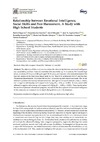Identificador persistente para citar o vincular este elemento:
https://accedacris.ulpgc.es/jspui/handle/10553/73573
| Campo DC | Valor | idioma |
|---|---|---|
| dc.contributor.author | Trigueros, Rubén | en_US |
| dc.contributor.author | Sanchez-Sanchez, Elena | en_US |
| dc.contributor.author | Mercader, Isabel | en_US |
| dc.contributor.author | Aguilar-Parra, José M. | en_US |
| dc.contributor.author | López-Liria, Remedios | en_US |
| dc.contributor.author | Morales Gázquez, María José | en_US |
| dc.contributor.author | Fernández-Campoy, Juan M. | en_US |
| dc.contributor.author | Rocamora, Patricia | en_US |
| dc.date.accessioned | 2020-06-30T10:15:48Z | - |
| dc.date.available | 2020-06-30T10:15:48Z | - |
| dc.date.issued | 2020 | en_US |
| dc.identifier.issn | 1661-7827 | en_US |
| dc.identifier.other | Scopus | - |
| dc.identifier.uri | https://accedacris.ulpgc.es/handle/10553/73573 | - |
| dc.description.abstract | The objective of this study was to analyse the relationship between emotional intelligence and social skills, and how these two variables influence bullying. In this study, 912 Spanish high school students, 471 boys and 441 girls aged 14–16 years, participated, who were administered the Spanish version of the Trait Meta Mood Scale 24, the “Bateria de socialización BAS-3” and the Peer Harassment Questionnaire. To analyse the results, a structural equation model was made. The results reflected a positive relationship between emotional intelligence and social skills (B = 0.44, p < 0.001), and a negative relationship with respect to bullying (B = −0.56, p < 0.001). In turn, social skills reflected a negative relationship with respect to bullying (B = −0.38, p < 0.001). These results reflect the need to implement educational programs focused on the development of emotional intelligence in the classroom, as a means to try to stop bullying behaviours in the classroom. | en_US |
| dc.language | eng | en_US |
| dc.relation.ispartof | International Journal of Environmental Research and Public Health | en_US |
| dc.source | International Journal of Environmental Research and Public Health [ISSN 1661-7827], v. 17 (12), 4208, (Junio 2020) | en_US |
| dc.subject | 32 Ciencias médicas | en_US |
| dc.subject.other | Adolescence | en_US |
| dc.subject.other | Bullying | en_US |
| dc.subject.other | Emotional Intelligence | en_US |
| dc.subject.other | High School | en_US |
| dc.subject.other | Social Skills | en_US |
| dc.title | Relationship between emotional intelligence, social skills and peer harassment. A study with high school students | en_US |
| dc.type | info:eu-repo/semantics/Article | en_US |
| dc.type | Article | en_US |
| dc.identifier.doi | 10.3390/ijerph17124208 | en_US |
| dc.identifier.scopus | 85086442716 | - |
| dc.contributor.authorscopusid | 56660596800 | - |
| dc.contributor.authorscopusid | 57217149622 | - |
| dc.contributor.authorscopusid | 57217000536 | - |
| dc.contributor.authorscopusid | 54973757100 | - |
| dc.contributor.authorscopusid | 28767849600 | - |
| dc.contributor.authorscopusid | 57216158820 | - |
| dc.contributor.authorscopusid | 56451144400 | - |
| dc.contributor.authorscopusid | 57211837791 | - |
| dc.identifier.eissn | 1660-4601 | - |
| dc.description.lastpage | 10 | en_US |
| dc.identifier.issue | 12 | - |
| dc.description.firstpage | 1 | en_US |
| dc.relation.volume | 17 | en_US |
| dc.investigacion | Ciencias de la Salud | en_US |
| dc.type2 | Artículo | en_US |
| dc.utils.revision | Sí | en_US |
| dc.date.coverdate | Junio 2020 | en_US |
| dc.identifier.ulpgc | Sí | es |
| dc.description.sjr | 0,747 | |
| dc.description.jcr | 3,39 | |
| dc.description.sjrq | Q2 | |
| dc.description.jcrq | Q1 | |
| dc.description.scie | SCIE | |
| dc.description.ssci | SSCI | |
| item.fulltext | Con texto completo | - |
| item.grantfulltext | open | - |
| crisitem.author.dept | GIR Investigación Básica y Aplicada en Ciencias de la Salud | - |
| crisitem.author.dept | Departamento de Enfermería | - |
| crisitem.author.orcid | 0000-0003-0338-0339 | - |
| crisitem.author.parentorg | Departamento de Ciencias Clínicas | - |
| crisitem.author.fullName | Morales Gázquez, María José | - |
| Colección: | Artículos | |
Citas SCOPUSTM
41
actualizado el 08-jun-2025
Citas de WEB OF SCIENCETM
Citations
37
actualizado el 01-feb-2026
Visitas 10
57
actualizado el 10-ene-2026
Descargas
63
actualizado el 10-ene-2026
Google ScholarTM
Verifica
Altmetric
Comparte
Exporta metadatos
Los elementos en ULPGC accedaCRIS están protegidos por derechos de autor con todos los derechos reservados, a menos que se indique lo contrario.
